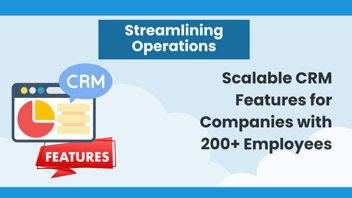Picking the right CRM is the foundation of your entire sales and marketing strategy. When it comes to HubSpot vs. Salesforce, you’re looking at two of the biggest names in the game. Both promise to help you track leads, automate sales, and keep customer relationships tight—but they do it in very different ways.
So, which one should you go with in 2025? Let’s break it down with the real differences in pricing, features, usability, and who they’re best for.
HubSpot vs. Salesforce: Key Differences
Both platforms are powerhouses, but they cater to very different businesses:
- HubSpot is known for its user-friendly interface, making it ideal for small and mid-sized businesses looking for an easy-to-use CRM with strong marketing automation.
- Salesforce is a feature-rich, enterprise-level solution designed for companies needing advanced customization, deep analytics, and complex sales processes.
The right choice depends on your company’s size, budget, and level of CRM expertise.
Pricing: HubSpot vs. Salesforce
One of the biggest considerations for businesses is cost. Here’s how the two CRMs compare in 2025:
HubSpot Pricing
- Free CRM: Includes basic contact management, email tracking, and reporting.
- Starter Plan: Starts at $50/month, adding marketing and sales automation.
- Professional Plan: $800+/month, with advanced automation, reporting, and lead scoring.
- Enterprise Plan: $3,600+/month, offering deeper customization, predictive AI tools, and advanced sales analytics.
Salesforce Pricing
- Essentials Plan: $25/user/month, with basic CRM functions.
- Professional Plan: $75/user/month, adding automation and forecasting.
- Enterprise Plan: $150/user/month, unlocking AI insights and deeper customization.
- Unlimited Plan: $300/user/month, with 24/7 support, advanced analytics, and full API access.
Key Takeaway: HubSpot’s pricing is more predictable and SMB-friendly, while Salesforce scales better for enterprises but comes with a higher cost per user.
Features Comparison
1. Ease of Use
- HubSpot: Beginner-friendly, with an intuitive dashboard and simple automation tools.
- Salesforce: More complex, requiring training or a dedicated admin to maximize its potential.
2. Sales & Marketing Automation
- HubSpot: Excellent for email automation, lead scoring, and campaign tracking within a single platform.
- Salesforce: Offers more in-depth automation with AI-powered forecasting, custom workflows, and pipeline management.
3. Customization & Integrations
- HubSpot: Integrates with 1,000+ third-party tools but has limited deep customization options.
- Salesforce: Offers extensive API and Billing integrations, making it fully customizable for any business need.
4. AI & Analytics
- HubSpot: Uses AI for basic sales forecasting and content recommendations.
- Salesforce: Leverages Einstein AI for predictive analytics, lead scoring, and advanced customer insights.
Key Takeaway: HubSpot wins for simplicity and ease of use, while Salesforce dominates in advanced customization and AI-driven insights.
Which CRM is Right for Your Business?
Choose HubSpot if:
- You’re a small to mid-sized business looking for an easy-to-use CRM.
- You need built-in marketing tools for automation, email campaigns, and lead nurturing.
- You prefer a predictable pricing model without per-user fees.
Choose Salesforce if:
- You’re a mid-to-large enterprise needing deep customization and scalability.
- You require advanced sales analytics, AI-driven insights, and multi-team collaboration tools.
- You have a dedicated team to manage CRM setup and maintenance.
Final Verdict
Both HubSpot and Salesforce are top-tier CRMs, but they serve different audiences. At the end of the day, the “best” CRM is the one that fits your business. If you need an affordable, easy-to-use solution with strong marketing automation, HubSpot is a great choice. However, if you require enterprise-grade customization, AI analytics, and deep integrations, Salesforce is the better investment.
Ultimately, no matter what you choose, having a CRM is a game-changer. Pick the right one, and you’ll scale your sales, automate the busywork, and keep customers locked in.





Leave a Comment